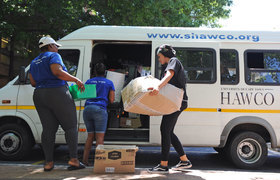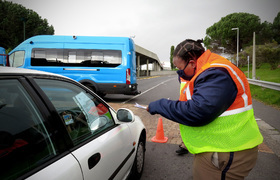Careers Service and Student Wellness receive funding boost
17 November 2020 | Story Nadia Krige. Photo Je’nine May. Read time 7 min.
The University of Cape Town’s (UCT) Careers and Student Wellness services have expanded their resources to help more students navigate the ups and downs of a particularly challenging year. This expansion was made possible through a grant from the Michael & Susan Dell Foundation.
When South Africa went into hard lockdown at the end of March 2020 to flatten the curve of COVID-19 infections, UCT found itself having to pivot rapidly from a university bustling with student life across campuses to an institution conducting the majority of its functions online.
While academic activities – such as lectures, research and exams – may be the first thing that comes to mind when talking about the effect that COVID-19 has had on UCT, departments supporting students on their journey toward a bright future have also had to deal with major changes and challenges.
Not least among these are the UCT Careers Service and Student Wellness Service (SWS).
When UCT’s campuses were closed, both services had to move from largely face-to-face interactions to a more digital approach. This required an increase in staff capacity as well as the development of additional digital resources, which was not possible without funding.
The Michael & Susan Dell Foundation’s work in university success centers around supporting the student’s entire experience – from academics to career services to mental health resources. With most universities experiencing an increase in the number of students requesting these services, collaborations with university partners across South Africa is imperative to ensure students can access the support and resources they need,” said Dr Thashlin Govender, the programme director at the Michael & Susan Dell Foundation.
The Careers Service and the SWS presented their proposals that aligned with the Dell Foundation’s work and were both awarded funding for their respective COVID-19 responses in July 2020.
Careers and health
The careers advisory team comprises four advisors with distinct areas of focus, all geared towards helping students achieve success throughout their time at UCT and beyond.
“It’s not just about getting them into the world of work,” said Ingrid van der Merwe, the head of the advisory team, “but to help them prepare to add meaningfully to society. We aim to create that kind of environment and help students with anything from researching their career options to polishing their CVs and preparing for job interviews.”
“We offer a holistic approach to student health and well-being.”
Advisory services are free to all UCT students from first year to PhD level and every stage in between. The team offers student consultations, career guidance and counselling, and develops contemporary career-related resources.
The SWS, on the other hand, is the home of all health-related services at UCT – covering everything from campus medical clinics to counselling.
“We are called Student Wellness Service because we offer a holistic approach to student health and well-being,” said Dr Memory Muturiki, the director of the SWS. “Our services reach out beyond just interacting with students who require therapeutic treatment at our clinics and include health promotion, prevention and mental-health awareness, and making sure that we interact with students well before they actually present with complex medical difficulties.”
Since success and mental health are often intertwined, the SWS and Careers Service often refer students to each another.
Reaching students where they are
“When we went into lockdown in late March, our work continued, with digital replacing face-to-face engagements,” said Van der Merwe.
“While we’re still dealing with the same sorts of queries as before, what has changed is the level of anxiety of students – particularly those in final year – about how COVID-19 will affect their chances of securing employment once they graduate.”
The Careers Service team realised that if this was the experience of the relatively small pool of students who were approaching them for assistance, there were probably many others suffering through the same sort of uncertainty who weren’t reaching out for help.
“The injection of capacity combined with the necessity to plan and report back on targets of student engagement for this award is bearing fruit.”
It quickly became obvious that in order for Careers Service to reach more of the UCT community when they needed it most, they would need to increase their capacity and develop more career advice resources that students could access remotely.
The funding from the Michael & Susan Dell Foundation has made it possible for Careers Service to appoint two additional career advisors and develop videos, online tools and fact sheets that address specific gaps for specific groups of students. These resources are available 24/7 on both Vula and the MyCareers portal.
“The injection of capacity combined with the necessity to plan and report back on targets of student engagement for this award is bearing fruit in ways that has extended our reach and deepened our engagement with students,” said Van der Merwe.
Making mental health accessible
Although the SWS has always had a 24-hour telephonic counselling hotline (which can be accessed by dialling 0800 24 25 26 or sending a text to 31393), they have had to develop and expand virtual lines of communication to support students – whether on campus or studying remotely.
“We are able to provide psychosocial support to students while they study remotely around the country through virtual counselling sessions with our psychologists and social workers as well as virtual medical consultations with our nurses, medical doctors and specialist psychiatrists. Students in Cape Town may also access face-to-face consultations,” said Dr Muturiki.
In addition to these consultations, the SWS has also recognised its Mental Health Peer Intervention programme as a first port of call for many students who might be battling with psychological issues during this time.
“The SWS peer counsellors are postgraduate students who have counselling undergraduate degrees,” said Muturiki. “Because they themselves are students at UCT and actually successfully obtained a qualification, they are able to assist students and support their academic work, adjustment issues and dealing with relationships.”
Using social media platforms, they can reach their fellow students in a more relatable manner than, for instance, official notices sent out via email. With their counselling backgrounds, they are able to refer students they interact with who may need additional help to the relevant department, whether that be other health practitioners within the SWS or even Careers Service.
The grant has enabled the SWS to appoint one additional peer counsellor to the team to head up marketing and communication and one counsellor to assist with one-on-one counselling and to develop and present a series of webinars and dialogues focusing on mental health and wellness. Students can tune in from wherever they find themselves and interact with counsellors as well as relevant health experts.
For more information visit the Careers Service website, make an online booking appointment on the SWS website or UCT app and connect with UCT’s SWS Peer Counsellors on Instagram.
 This work is licensed under a Creative Commons Attribution-NoDerivatives 4.0 International License.
This work is licensed under a Creative Commons Attribution-NoDerivatives 4.0 International License.
Please view the republishing articles page for more information.










